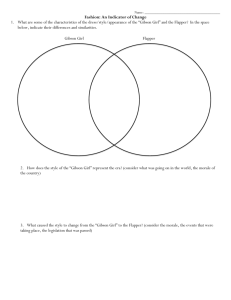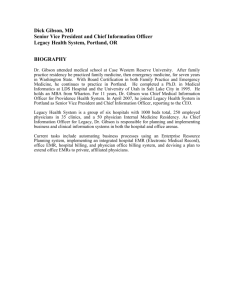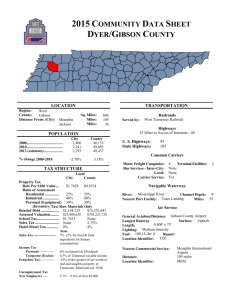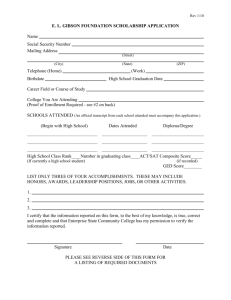U.S. Attorney Applies HIPAA Criminal Penalty Provisions in First Conviction... Privacy Violations Stacey A. Tovino
advertisement
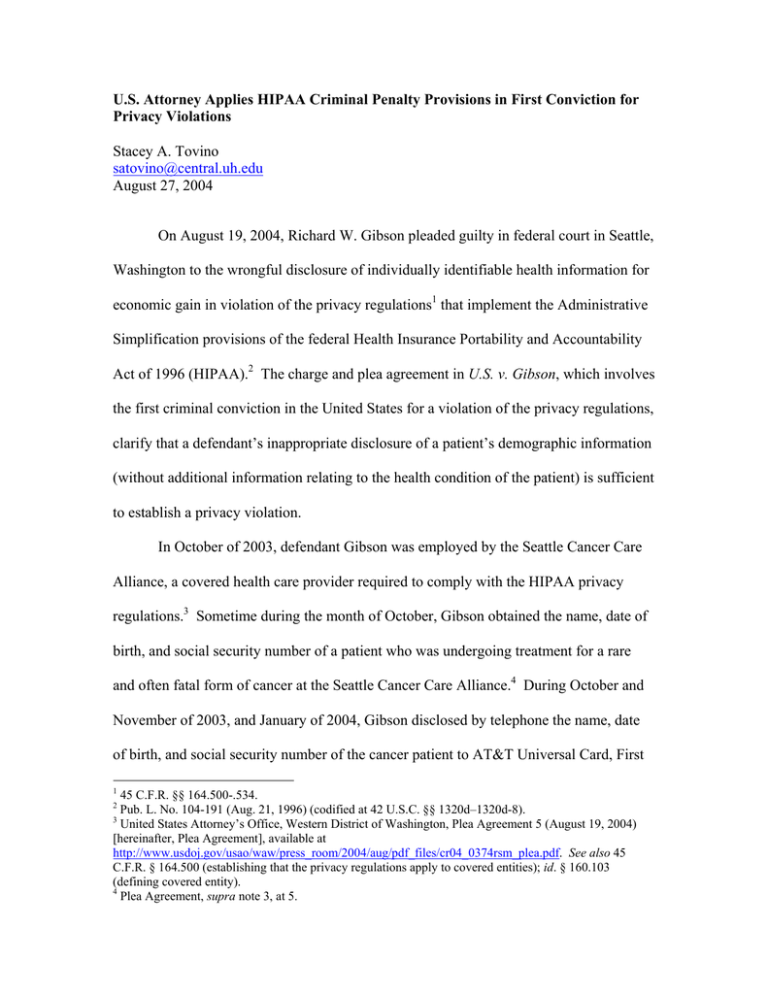
U.S. Attorney Applies HIPAA Criminal Penalty Provisions in First Conviction for Privacy Violations Stacey A. Tovino satovino@central.uh.edu August 27, 2004 On August 19, 2004, Richard W. Gibson pleaded guilty in federal court in Seattle, Washington to the wrongful disclosure of individually identifiable health information for economic gain in violation of the privacy regulations1 that implement the Administrative Simplification provisions of the federal Health Insurance Portability and Accountability Act of 1996 (HIPAA).2 The charge and plea agreement in U.S. v. Gibson, which involves the first criminal conviction in the United States for a violation of the privacy regulations, clarify that a defendant’s inappropriate disclosure of a patient’s demographic information (without additional information relating to the health condition of the patient) is sufficient to establish a privacy violation. In October of 2003, defendant Gibson was employed by the Seattle Cancer Care Alliance, a covered health care provider required to comply with the HIPAA privacy regulations.3 Sometime during the month of October, Gibson obtained the name, date of birth, and social security number of a patient who was undergoing treatment for a rare and often fatal form of cancer at the Seattle Cancer Care Alliance.4 During October and November of 2003, and January of 2004, Gibson disclosed by telephone the name, date of birth, and social security number of the cancer patient to AT&T Universal Card, First 1 45 C.F.R. §§ 164.500-.534. Pub. L. No. 104-191 (Aug. 21, 1996) (codified at 42 U.S.C. §§ 1320d–1320d-8). 3 United States Attorney’s Office, Western District of Washington, Plea Agreement 5 (August 19, 2004) [hereinafter, Plea Agreement], available at http://www.usdoj.gov/usao/waw/press_room/2004/aug/pdf_files/cr04_0374rsm_plea.pdf. See also 45 C.F.R. § 164.500 (establishing that the privacy regulations apply to covered entities); id. § 160.103 (defining covered entity). 4 Plea Agreement, supra note 3, at 5. 2 USA Visa, Chase Manhattan Bank, and Fleet Credit Card Services for purposes of obtaining credit cards in the cancer patient’s name.5 Gibson used the credit cards to obtain cash advances and to purchase various items including video games, home improvement supplies, apparel, jewelry, porcelain figures, groceries, and gasoline.6 The total value of the debt Gibson incurred was $9,139.42.7 On August 18, 2004, the United States Attorney’s Office filed a one-count charge in the United States District Court for the Western District of Washington stating that Gibson “knowingly and for a reason other than permitted by [HIPAA] disclosed individually identifiable health information of [a patient], with intent to use that information for personal gain.”8 The charge specifically noted that Gibson disclosed the information for Gibson’s “own personal economic gain.” The following day, Gibson waived his right to be charged by indictment and plead guilty.9 In addition to civil money penalties of not more than $100 for each violation (with a $25,000 limit for all violations of an identical requirement or prohibition during a calendar year),10 individuals who knowingly disclose individually identifiable health information in violation of the privacy regulations also are subject to one of three different levels of criminal penalties.11 The first level, which applies to a person “who knowingly and in violation of [HIPAA] . . . discloses individually identifiable health information to another person,” establishes a fine of not more than $50,000, 5 Id. at 6. Id. 7 Id. 8 United States Attorney’s Office, Western District of Washington, Charge in U.S. v. Gibson, No. CR-040374RSM (filed August 18, 2004) [hereinafter, Charge], available at http://www.usdoj.gov/usao/waw/press_room/2004/aug/pdf_files/cr04_0374rsm_inf.pdf. 9 Plea Agreement, supra note 3, at 1. 10 42 U.S.C. § 1320d-5(a)(1). 11 Id. § 1320d-6(b)(1)-(3). 6 imprisonment of not more than one year, or both.12 The second level, which applies to a person who commits an offense under “false pretenses,” establishes a fine of not more than $100,000, imprisonment of not more than five years, or both.13 The third level, which applies to a person who commits an offense “with intent to sell, transfer, or use individually identifiable health information for commercial advantage, personal gain, or malicious harm,” establishes a fine of not more than $250,000, imprisonment of not more than ten years, or both.14 The United States Attorney’s Office charged Gibson with the general civil money penalty of $100 and, in light of Gibson’s use of patient information for his own commercial gain, a third level criminal penalty.15 In the Plea Agreement, both parties agreed that the appropriate sentence to be imposed by the court at the time of sentencing should be a Zone C sentence within the range of ten to sixteen months.16 On November 5, 2004, U.S. District Court Judge Ricardo S. Martinez will determine whether to accept the Plea Agreement. Gibson has also agreed to pay restitution to the credit card companies and to the patient for the expenses incurred.17 In a related press release, U.S. Attorney John McKay stated that, “This case should serve as a reminder that misuse of patient information may result in criminal prosecution.”18 The health care industry has been eagerly waiting for cases that will demonstrate the types of privacy violations to which the three different levels of criminal penalty 12 Id. § 1320d-6(b)(1). Id. § 1320d-6(b)(2). 14 Id. § 1320d-6(b)(3). 15 Charge, supra note 8, at 2; Plea Agreement, supra note 3, at 2. 16 Plea Agreement, supra note 3, at 6. See also Fed. R. Civ. P. 11(c)(1)(C). 17 United States Attorney’s Office, Western District of Washington, Press Release: Seattle Man Pleads Guilty in First Ever Conviction for HIPAA Rules Violation (August 19, 2004), available at http://www.usdoj.gov/usao/waw/press_room/2004/aug/gibson.htm. 18 Id. 13 provisions apply. The U.S. Attorney’s third-level charge is not surprising in light of Gibson’s use of patient information for his own commercial gain. The public will have to wait for additional cases to see how the U.S. Attorney interprets the “false pretenses” language in the second-level criminal penalty provision. The documentation relating to the conviction is also important because it confirms the U.S. Attorney’s belief that the disclosure of “just” demographic and other similar information (such as a patient’s name, date of birth, and social security number) is sufficient to constitute an inappropriate disclosure of “individually identifiable health information.”19 Stated another way, the U.S. Attorney did not require the defendant to have disclosed specific information relating to the patient’s past, present, or future physical or mental condition, the covered entity’s provision of care to the patient, or the payment for the provision of care to the patient, as some members of the health care industry have suggested is required to establish a privacy violation.20 19 45 C.F.R. § 160.103 (defining “individually identifiable health information” as “information that is a subset of heath information, including demographic information collected from an individual, and: (1) Is created or received by a health care provider, health plan, employer, or health care clearinghouse; and (2) Relates to the past, present, or future physical or mental health or condition of an individual; the provision of health care to an individual; or the past, present, or future payment for the provision of health care to an individual; and (i) That identifies the individual; or (ii) With respect to which there is a reasonable basis to believe the information can be used to identify the individual”). 20 42 U.S.C. § 1320d-6(a)(3) (establishing an offense for a person who knowingly discloses “individually identifiable health information” to another person in violation of the privacy regulations). See also note 19, supra (defining “individually identifiable health information”).
